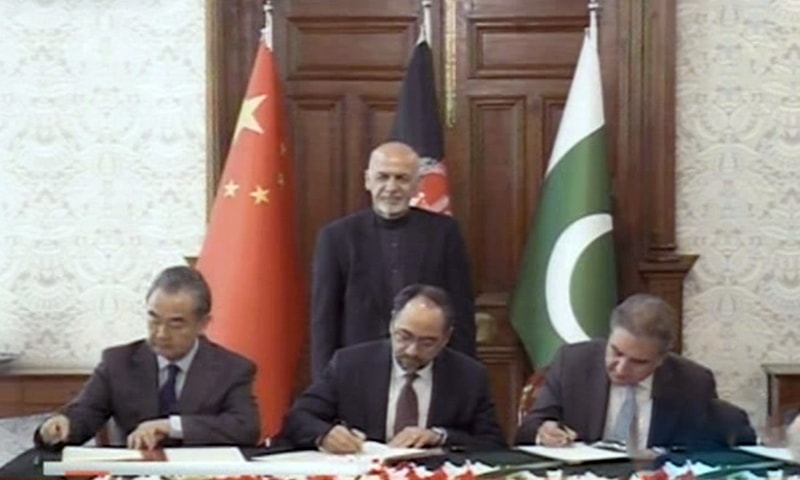Foreign Minister Shah Mehmood Qureshi, during a meeting with his Afghan and Chinese counterparts Salahuddin Rabbani and Wang Yi on Saturday, reiterated Pakistan's stance that peace in Afghanistan can only be achieved through dialogue.
The foreign minister is in Kabul on a day-long official trip to attend the second round of the trilateral ministerial dialogue between Pakistan, Afghanistan and China. He is heading a Pakistani delegation that also includes Foreign Secretary Tehmina Janjua and other high-ranking officials of the Foreign Office.
"Since the beginning [of the Afghan conflict], Pakistan has advocated for dialogue instead of military action to achieve peace. Today the world is agreeing with our stance," the foreign minister said during the meeting, adding that as a neighbour, Pakistan had "suffered most due to the Afghan situation".
The dialogue aims to pave way for a solution to the Afghan crisis through political means since peace in Afghanistan is vital for regional growth and development, he said.
In order to defeat terrorism, Qureshi said, there is a need for increased cooperation and intelligence exchange between the neighbours.
"A bilateral relationship between Pakistan and Afghanistan is of extreme importance to our government," he said.
Furthermore, the trio of delegations discussed the importance of China and Pakistan's "technical assistance in different sectors" for Afghanistan's progress. Qureshi said that "mega projects" like the construction of a motorway connecting Peshawar and Kabul and a railway network between Quetta and Kandahar can strengthen trade relations between the three countries.
The foreign minister insisted that cooperation between Pakistan, Afghanistan and China was vital for a "prosperous, stable and peaceful future of the region".

Qureshi further said that job creation and progress were the only way to counter the “challenge of terrorism”.
After the meeting, the foreign ministers also signed a memorandum of understanding (MoU) for cooperation over curbing terrorism.
One of the three sessions of the daylong foreign ministers’ dialogue was dedicated to security. The other two sessions focused on the political settlement of the Afghan conflict and regional cooperation.
They are also scheduled to meet Afghan President Ashraf Ghani today.
The first ministerial meeting held in Beijing in December last year had helped Islamabad and Kabul make progress on the establishment of ‘Afghanistan-Pakistan Action Plan for Peace and Solidarity (APAPPS)’, which then became the new framework for steering the bilateral relations.
China aims to create 'favourable environment' between Pakistan and Afghanistan
Qureshi's Chinese counterpart, Yi, in a joint press conference held after the meeting between the foreign ministers, said that China "aims to help create a favourable environment between Pakistan and Afghanistan".
Yi highlighted the close relationship between China and Pakistan, saying that both countries were "all-weather friends and important strategic partners".
He further said that "as a friend of both countries, China is making every effort to build confidence between Pakistan and Afghanistan."
The Chinese foreign minister declared that China will assist both countries in the provision of clean drinking water and building infrastructure, including the construction of a rail network to connect Afghanistan and Pakistan.
Addressing the Afghan crisis, Yi said: "In order to further the process of reconciliation, [Afghan] Taliban will have to be ushered to the dialogue table." The Chinese foreign minister further said that war was not a solution to any problem.
"We urge the [Afghan] Taliban to take advantage of this chance for peace and hold negotiations," Yi said.
Qureshi thanked China for its role in "bringing Afghanistan and Pakistan closer". He added that the ball was now in Afghanistan's court as it has to decide which route they wished to take in order to achieve peace.
Answering reporters' questions on the occasion, Afghan foreign minister claimed that Afghanistan's people had borne many difficulties and regretted that violence in his country was increasing.
Rabbani also addressed the dwindling relations between Afghanistan and Pakistan and said: "Pakistan has always said that it supports Afghanistan. It is time that practical steps are taken in this regard."
After the trilateral ministerial dialogue session, Qureshi held a separate meeting with his Afghan counterpart where both officials discussed matters of mutual interest. Rabbani also thanked Qureshi for taking part in the joint peace effort.

